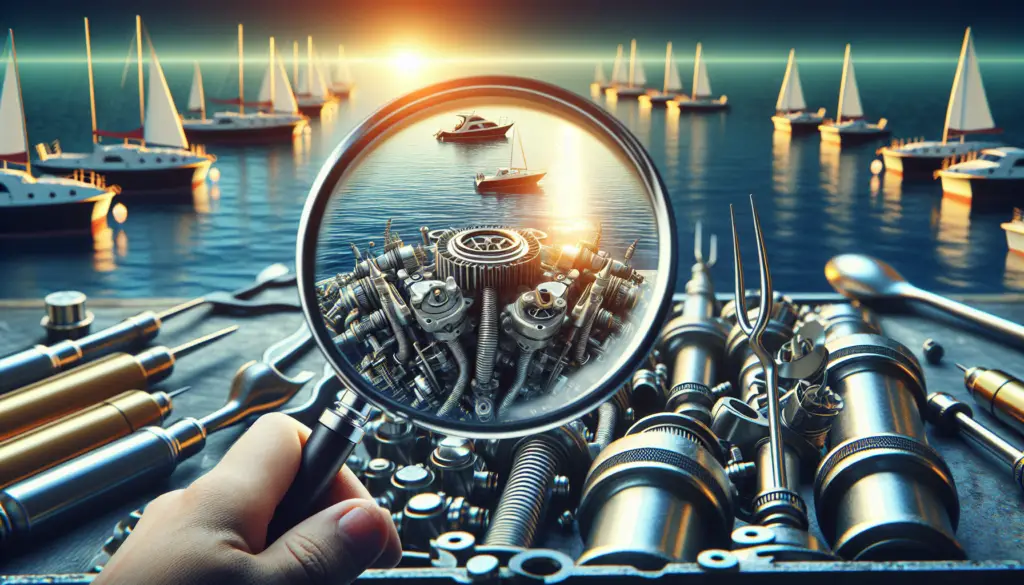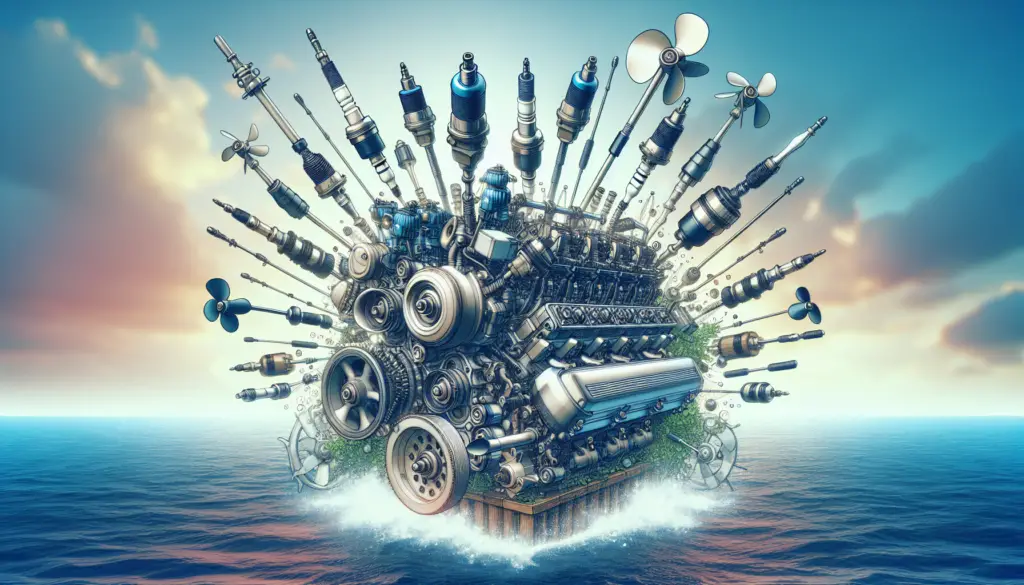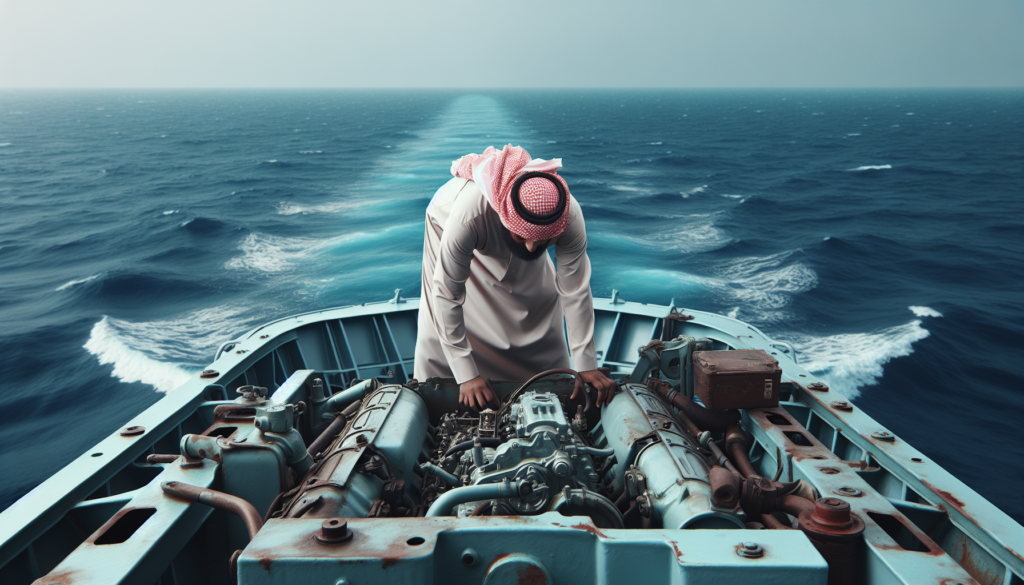Imagine yourself out at sea, the waves gently rocking your boat, when suddenly your engine coughs and sputters out of life. Panic sets in as you find yourself stranded miles away from the shore. This unnerving scenario can quickly turn into an empowering one with a bit of knowledge and preparation. “How To Troubleshoot Common Boat Engine Problems At Sea” is your handy guide to transform you from a novice sailor to a savvy sea captain. It equips you with the essential skills and tricks of the trade to quickly diagnose and fix common boat engine issues while out at sea. So, the next time your boat engine decides to throw a tantrum in the middle of the ocean, you’ll know exactly what to do!

Understanding the Basics of Boat Engine
The heart of every vessel, a boat engine, is the driving force that powers your journey across the waters. However, to maintain and troubleshoot this crucial component, you should first understand the basics of how it works.
Types of Boat Engine
Boat engines come in varieties, each with its unique attributes. The two most common types are the outboard engine and the inboard engine. Outboard engines, as the name implies, are affixed to the outside of the boat. They are easily accessible for maintenance and can be lifted out of water when not in use. On the other hand, inboard engines are positioned inside the vessel, offering improved balance and a quieter operation.
Key Components of a Boat Engine
Each boat engine is a complex system with several key components. These include the cylinders, where fuel is combusted to generate power, the spark plugs, which ignite the fuel, and the crankshaft, converting linear motion into rotational motion to power the boat. Other vital components include the carburetor, which mixes fuel with air, and the exhaust system, allowing waste gases to escape.
How a Boat Engine Works
A boat engine operates on a simple concept. Fuel and air are mixed in the right ratio in the carburetor, then fed into the cylinder where they are ignited by the spark plug, causing an explosion. This explosion drives the pistons, whose movement rotates the crankshaft and propels the boat forward. The entire operation is a synchronized dance of specific parts working in harmony to generate power.
Identifying Common Boat Engine Problems
As every experienced sailor knows, boat engines can encounter various issues, which can lead to a complicated and potentially dangerous situation. Here’s what you need to know about common engine problems.
Engine Won’t Start
Your boat engine refusing to start is one of the most frustrating situations. It could be due to factors like battery issues, a poor electrical connection, or a deficient ignition system.
Engine Overheats
Overheating is a common problem in boat engines. It typically happens if the cooling system is clogged, the thermostat is faulty, or the water pump can’t function properly.
Loss of Engine Power
If your boat engine suddenly loses power, you may be dealing with issues such as a clogged fuel system or issues with the propeller.
Excessive Fuel Consumption
If your boat is guzzling fuel, it could be a sign of faulty sensors, blocked air filters, or dirty injector nozzles.
Engine Vibrates Excessively
Excessive engine vibration can indicate severe underlying issues. Likely causes include misaligned engines, worn-out parts, or a problematic drive system.
Engine Stalls
Engine stalling can be attributed to several issues like problems within the fuel system, faulty electrical structures, blocked air intake, or malfunctioning exhaust system.
Poor Acceleration
If your boat struggles to pick up speed, it could have a dirty throttle body, faulty fuel pump, vacuum leaks, or problematic spark plugs.

Troubleshooting a Boat Engine that Won’t Start
Imagine you’re all set for a day out on the water and your engine stubbornly refuses to start. Fear not, as the issue can often be diagnosed and fixed.
Checking for Fuel Issues
The first stop in troubleshooting a non-starting engine is the fuel system. Ensure the tanks have enough fuel and verify the fuel lines and filters for clogging.
Inspecting Electrical Components
An engine won’t start if there’s an issue with the electrical system. So, always ensure the battery is charged, the wiring is snug, and the fuses aren’t blown.
Looking into Ignition System
If the above checks are clear, turn your focus on the ignition system. Verify if the spark plugs are in good shape and distributing spark correctly.
Examining the Compression System
Lastly, it’s time to check the compression system. The engine won’t start if the pistons aren’t creating enough pressure.
Addressing Overheating Issues in Boat Engines
Boat engine overheating can lead to severe damage if not promptly addressed. Here’s how.
Flush the Cooling System
Should you notice your engine overheating, the first approach should be to flush the cooling system to clear possible blockages.
Inspect the Thermostat
An unresponsive thermostat could prevent the cooling system from kicking in when required. Ensure it opens enough to let coolant through.
Check for Leaks in the Cooling System
Leaks can cause your engine to run hot. Regularly inspect the cooling system and mend as needed.
Examine the Water Pump
Lastly, a faulty water pump may not circulate coolant properly, causing the engine to overheat.

Resolving Loss of Engine Power
Should your boat engine lose power, the propulsion and your safety are compromised.
Cleaning the Fuel System
A dirty fuel system can choke your engine off the power. Ensure the fuel filters and lines are clean and fuel is reaching your engine.
Inspecting the Propeller
A damaged propeller could limit the boat’s movement leading to a decrease in engine power.
Checking Engine Timing
If your engine’s timing is off, it can lose power. Ensure the spark plugs fire at the right times to maintain the power.
Verify the Compression Strength
Last but not least, check the compression system. If the engine’s compression strength is low, it can affect the power output.
Dealing with Excessive Fuel Consumption
A boat engine consuming more fuel than usual is not good for your wallet or the environment. Here’s how to rectify it.
Ensure Proper Maintenance of the Engine
Keeping your engine in peak condition can prevent excessive fuel consumption. Regular maintenance is crucial.
Check for Failing Sensors
Faulty sensors can lead to fuel inefficiency. Ensure your oxygen and flow sensors are in good condition.
Inspect the Air Filter
A dirty air filter restricts air flow to the carburetor, leading to an overly rich fuel-air mixture wasting fuel. Clean or replace the filter as needed.
Examine the Injector Nozzles
Clogged injector nozzles can send too much fuel into the combustion chamber, leading to wastage. Regular cleaning can help.

Fixing an Engine that Vibrates Excessively
Although a certain level of vibration is normal, excessive vibration can indicate serious issues.
Ensuring Proper Engine Alignment
Misaligned engines can cause vibrations. It’s important to ensure your engine is correctly lined up with the boat’s driveshaft.
Inspecting for Worn Out Components
Too much vibration can also be due to worn components. Look for parts that need replacement to smooth out the ride.
Checking the Engine Mount
The engine mount absorbs vibrations, and a faulty one can cause the engine to rattle. Regular inspection can identify such issues.
Looking at the Drive System
The boat’s drive system can cause vibrations if it’s not functioning well. Always check for any signs of trouble.
Handling Engine Stall Issues
An engine that stalls can be both frustrating and dangerous. Here’s what you need to check.
Check the Fuel System
An engine needs a steady fuel supply to keep running. Troubleshoot any blockages or restrictions in the fuel system.
Examine the Electrical System
The electrical system is key for the engine’s operation. Look out for any defective or worn-out components that need replacement.
Inspect the Air Intake and Exhaust
Air and fuel need to flow efficiently for the engine to work. Make sure there are no obstructions in these systems.
Looking into the Ignition System
If the ignition system has issues, it can lead your engine to stall. Regularly inspecting it can prevent such problems.
Improving Poor Acceleration in Boat Engines
Poor acceleration can affect the thrill of boating. Here’s how you can improve it.
Clean the Throttle Body
A dirty throttle body can restrict air flow and hamper acceleration. Cleaning it regularly can help.
Inspect the Fuel Pump
A faulty fuel pump can’t supply enough fuel, resulting in poor acceleration. Regular checks can catch issues early.
Check for Vacuum Leaks
Vacuum leaks can adversely affect engine performance, including acceleration. Regular inspections can help identify and fix such gaps.
Examine the Spark Plugs
Old or fouled spark plugs can fail to ignite the fuel-air mixture effectively, leading to poor acceleration. Regular replacement can avoid this.
Preventive Measures to Avoid Common Boat Engine Problems
Remember, an ounce of prevention is worth a pound of cure, and that holds true for boat engines as well.
Regular Engine Maintenance
Scheduled maintenance can ensure that your boat engine remains in top form. Small issues can be identified and fixed before they exacerbate.
Correct Use of Engine
Always operate the engine within its capabilities. Pushing it beyond its limit can lead to issues.
Frequent Checks on The Cooling System
The cooling system plays a vital role in engine health. Regular checks can ensure it’s functioning well and protect your engine from overheating.
Timely Replacement of Worn out Components
Parts wear out over time. Replacing them promptly can prevent problems that may arise from their failure.
Proper Winterization of Boat Engines
Boat engines that sit idle during the winter months need proper care. A thorough winterization process can protect your engine from cold weather damage.
Remember, a healthy boat engine ensures a fun and hassle-free boating experience. Always keep an ear open for any strange noises, watch for unusual smoke, and be aware of any performance changes. When in doubt, it’s always best to consult with a professional marine mechanic.


[…] the Water”. Armed with these practical, easy-to-follow tips, you’ll be able to diagnose common boat engine problems and execute quick, effective fixes. It’ll be your lifeline when you’re adrift, guiding […]
[…] sea is quite daunting. To help you forestall such situations, the article “What Are The Most common boat engine problems and How to Avoid Them?” sheds light on the typical issues that plague boat engines. It […]